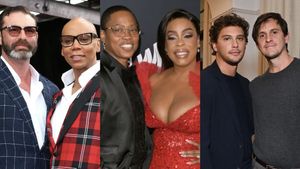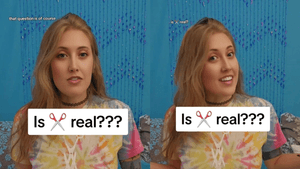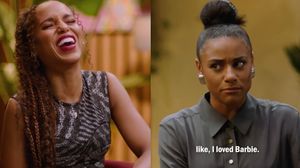
CONTACTStaffCAREER OPPORTUNITIESADVERTISE WITH USPRIVACY POLICYPRIVACY PREFERENCESTERMS OF USELEGAL NOTICE
© 2024 Pride Publishing Inc.
All Rights reserved
All Rights reserved
By continuing to use our site, you agree to our Private Policy and Terms of Use.
One of the outrageous ironies of the recent media reports of gay teen suicides can be found in a less-reported but equally significant story of 2010. A landmark study published in the journal Pediatrics in June shattered long-held myths by concluding that children of lesbian parents are better adjusted than children of heterosexual parents. Lesbians' kids score higher on psychological measures of confidence and self-esteem, excel academically, and are less likely to have behavioral problems. The long-term study, which focused on lesbian families because the "gayby boom" began earlier with women, pointed to a variety of possible reasons, with family planning and an awareness of discrimination among them.
Breaking every nasty stereotype perpetuated by bigots, the kids of gay parents are indeed all right. The irony lies in the fact that it's the children of straight parents who are very much in a full-blown crisis, be they gay and victims of bullying or the perpetrators of bullying themselves. It's hard to know if gay teen suicides are on the rise or if media reports--and the use of the Internet to get news out--have focused more attention on them. But one thing is certain: They're happening at an unacceptable rate.
Syndicated columnist and author Dan Savage, who started the It Gets Better Project on YouTube in response to the suicides, believes that despite the gains of the gay equality movement and the coming out of celebrities here and there, life is worse today for LGBT teens than it was 20 years ago, particularly for those living far from urban areas. While the gay political movement has made dramatic strides, he says, most of those advances have been for adults in big cities. And, at the same time, the religious right has come full force out of its own closet--condemning homosexuality and pushing "ex-gay" therapy. In suburban and rural areas, preachers attack gays, ugly campaigns have been waged to bar gays from marrying, and politicians rail that gays shouldn't be teaching in schools.
Savage is on to something: As we have moved ahead with a civil rights movement for LGBT adults--marriage, employment nondiscrimination laws, adoption and gay parenting--the organized political movement has largely ignored the backlash our success has triggered and, more significantly, ignored how that backlash hurts gay youths. Yes, there are excellent groups focused on these issues, such as the Gay, Lesbian, and Straight Education Network and Parents, Families, and Friends of Lesbians and Gays. But many gay adults, unless they have children themselves, are far removed from these issues and often see fighting discrimination in their own lives as more important. It's true, of course, that progress for LGBT adults helps everyone in the long run. If LGBT people had full civil rights--equal marriage rights and federal constitutional protections against discrimination--homophobia would diminish in society and young people would grow up in a better world. Surely that's a common goal of all of those fighting for marriage equality and an end to discrimination. But in a world of instant gratification we sometimes forget that full equality is going to be a long time off. And the hate will only get worse.
It will be many years before marriage equality and antidiscrimination protections come to every state. And the New Hampshire example shows that even after equality is won, it may be many years before antigay forces stop trying to strip away hard-earned rights. We'll be fighting for a long time. One battlefield will continue to be the schools, where young people will be targeted. And it's not just the gay kids and those who are perceived to be gay who are under attack, it's also those whose parents are gay or lesbian who are being singled out as different by bullies.
The problem is only going to get worse unless there is a concerted effort to dramatically change the culture of schools. Often we're dealing with the symptoms rather that the larger problem when it comes to bullying and homophobia.
"Right now we focus on the individual kids' problems," she explains. "Conversations are about bullying prevention, and those things are important. But why has the effeminate male been the primary target of bullying for so many years? The problem with the bullying programs is that we reeducate the bully and then there's another one right behind that one, because we haven't really questioned the structure of the school itself. The football players [and] the cheerleaders are the most valued. It's based on gender. We have to question schools about how they're privileging that, and the school needs to equally send those messages that it's OK to excel at other things."
We also must battle a message that's reinforced far beyond the schools through a popular culture that still values the macho male and demonizes those who are perceived as effeminate. A case in point is the controversy that erupted a few months ago after the trailer for the Ron Howard film The Dilemma was shown in theaters. Star Vince Vaughn's character jokes that "electric cars are gay." The fact that he tries to clarify by saying, "I mean, not 'homosexual' gay, but 'my parents are chaperoning the dance' gay," only underscores the ugliness of the message. "Gay" isn't just a sexual orientation; it's nerdy, weak, and undesirable. When Hollywood and pop culture help to solidify the messages coming from antigay politicians and preachers, it shouldn't shock anyone that it plays out detrimentally among young people.
Not until we address these larger and more challenging aspects of culture, in schools and beyond, will we see the bullying and the suicides diminish. And changing the culture will have a positive effect--not just on LGBT youths but on all kids, including the bullies. If there's one thing all parents can glean from the landmark study of children of lesbian parents, it's that teaching kids about difference and acceptance seems to be part of the mix in building self-esteem and confidence for all.
From our Sponsors
Most Popular
31 Period Films of Lesbians and Bi Women in Love That Will Take You Back
December 09 2024 1:00 PM
18 of the most batsh*t things N.C. Republican governor candidate Mark Robinson has said
October 30 2024 11:06 AM
True
After 20 years, and after tonight, Obama will no longer be the Democrats' top star
August 20 2024 12:28 PM
Trump ally Laura Loomer goes after Lindsey Graham: ‘We all know you’re gay’
September 13 2024 2:28 PM
Melania Trump cashed six-figure check to speak to gay Republicans at Mar-a-Lago
August 16 2024 5:57 PM
Latest Stories
Gayest moments in Sabrina Carpenter's 'A Nonsense Christmas' special
December 17 2024 9:18 PM
Tammy Baldwin, 20 other senators try to strike anti-trans provision from defense bill
December 17 2024 6:46 PM
Montana court blocks enforcement of ban on gender marker changes
December 17 2024 5:07 PM
No, the Wisconsin school shooter wasn’t transgender
December 17 2024 4:46 PM
Angie Craig elected first woman and first LGBTQ+ ranking member of House Agriculture Committee
December 17 2024 4:21 PM
Florida Republican wants to ban Pride flags in public buildings
December 17 2024 1:59 PM
To this pro men's tennis player, coming out was 'so normal that I didn’t think about it'
December 17 2024 1:28 PM
Toni Atkins on running to become California's first lesbian governor (exclusive)
December 17 2024 12:24 PM

















































































